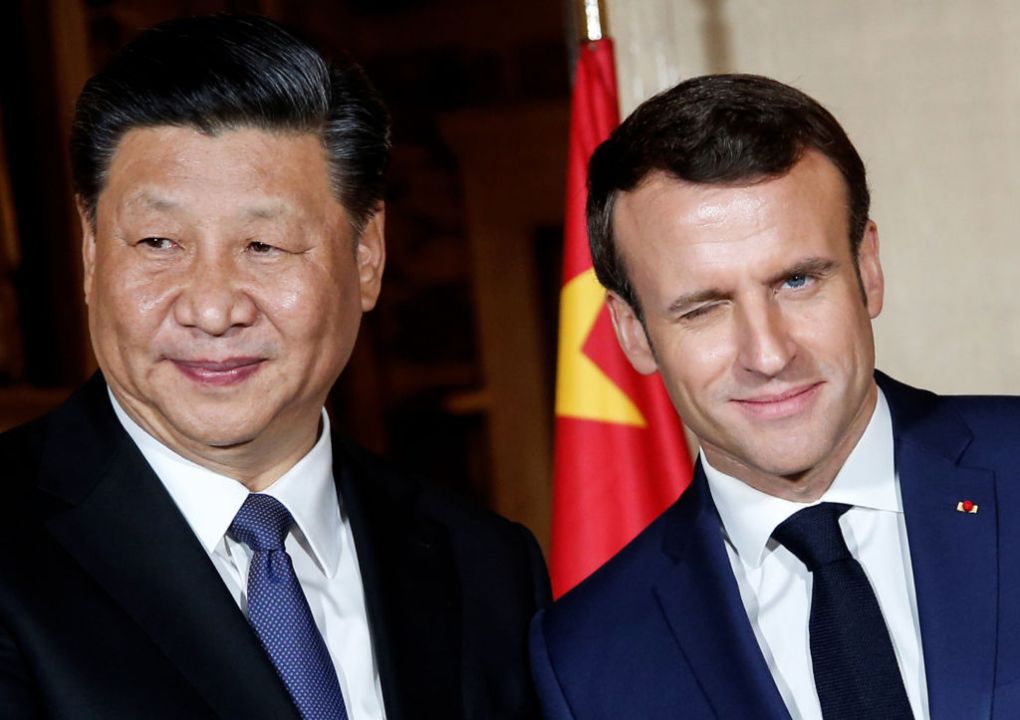Chinese president Xi Jinping came to France and is taking home 300 Airbus jetliners, a large consignment of frozen chickens and a wind farm. A great triumph for France, declared Emmanuel Macron. And for Macron? Never mind that many of the planes will be built in China. Or that Airbus is no longer a French company but an international one, although headquartered in Toulouse. Or that the hens are unlikely to be free range. It’s hard to argue with a cheque for £30 billion. Or to stop a politician taking credit for a deal that’s been in the works for years.
To cement his triumph, Macron hosts Xi today at an impromptu summit at the Elysée palace with Angela Merkel and Jean-Claude Juncker. The theme is the challenge of multilateralism – code for opposition to Donald Trump’s unilateral approach. It suits Xi, whose entire visit has been a calculated kick in the teeth to Trump. Washington is struggling to conclude its own trade deal with China, even as America’s own national champion and America’s biggest exporter, Boeing, was losing customers after the 737 Max grounding. It surely helps Macron. The subtext, evidently, of this essentially decorative spectacle is to reinforce Macron’s bid to lead all Europe, once Merkel departs.
Even those like me who fear there is a pathology in Macron’s narcissism, grandiosity and hypomania, must concede that this has been a better start to the week for the president. Paris was pretty calm on Saturday after he fired the police prefect and replaced him with an ultra hardliner. The anarchists didn’t show up and the gilets jaunes demonstrated mostly peacefully. This is well timed as Macron ramps up to the May European election campaign, which he is using as the chance to renew his fraying authority and to launch his new European renaissance project. Having abandoned, for the moment, his effort to impose meaningful structural reforms on the French economy, he is morphing into a new role as a European and international statesman, leaving the grubby business of government to his ministers, who are summonsed to the Elysée from time to time to be reminded of their inadequacies.
The past 19 weeks have been rough for Macron and France. The gilets jaunes have not gone away. The great national debate (really a monologue) impressed inside the Périphérique but was mostly a damp squib in provincial France. The president and Brigitte managed to be caught skiing ten days ago as the Champs Elysée was ransacked by anarchists. He was slapped down by Angela Merkel as he attempted to steer the hardest possible line against the UK in the Brexit end-game. Macron wants Britain out, seeing it as an obstruction to the federalisation of the EU. Merkel is worried about the German car manufacturers, who refer to the UK as treasure island.
Paris remains a city unlikely to attract bankers fleeing Brexit island. Passengers are queuing for hours at the Gare du Nord to be allowed on the Eurostar. Porsches burn in the first arrondissement. Amnesty International and the UN have condemned the disproportionality of the French police. Macron has gained some ground in the polls after dominating the complaisant media with his debate, but at best still hovers around a 30 per cent approval rating. Even those intending to vote for his European parliament list will be holding their noses. The electoral system could have been designed for Macron but Marine Le Pen’s reanimated Rassemblement National is bound to capture many seats. Meanwhile, France is teetering on the brink of recession despite the rosy forecasts from the finance ministry.
What has Xi received in return for opening his chequebook? Doubtless, he will not be leaving Europe without a few souvenirs. Xinhua, the official Chinese news agency, spoke of a strengthened global partnership. But this will not come without tensions, within Europe and outside. Before visiting France, Xi was in Italy which signed up to China’s Belt and Road project to a chorus of disapproval from elsewhere in Europe, including Paris, which declined to follow suit. The Trump administration is putting heavy pressure on Europe to resist the Chinese telecommunications giant Huawei, which the Americans say is effectively an arm of the Chinese government. Huawei was not, as far as I can tell, mentioned in any of the official communiqués concerning Xi’s European visit. It is impossible it was not discussed.
Jonathan Miller is the author of France a Nation on the Verge of a Nervous Breakdown (Gibson Square). He tweets at @lefoudubaron








Comments